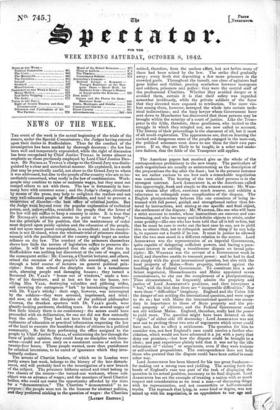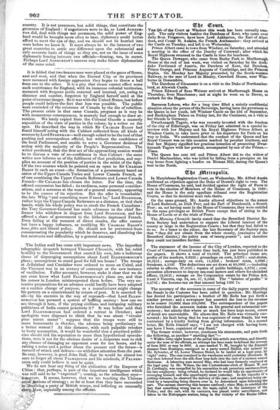The American papers last received give us the whole of
the correspondence preliminary to the new treaty. The particulars of such negotiations are usually as uninteresting as the description of the preparations the day after the feast ; but in the present instance we are rather curious to see how such a remarkable negotiation was conducted. The bearing of the two chief persons is in the strongest contrast. Lord Amnon:mu is, as the Americans called him approvingly, frank and simple to the utmost extent : Mr. WEB STER strains after effect, exercises much reserve, and exhibits a reluctance to relinquish some complication of the dispute. The English plenipotentiary behaves like one conscious of being in trusted with full power, guided and strengthened rather than fet
tered by instructions, and aiming at one specific and final object, the settlement of the dispute : Mr. WEBSTER, like one who will have a strict account to render, whose instructions are onerous and em. barrassing, and who has many and indefinite objects to attain, under some penalty—like one who has been told that all is left to him, but that he must be sure to make out the best case he can, not to yield this, to obtain that, not to relinquish another thing if he can help it, to squeeze out a fourth if he can. It must in justice be allowed that the two men stood in a different relation to the matter. Lord ASHBURTON was the representative of an imperial Government, quite capable of delegating sufficient powers, and having a paramount interest in settling a troublesome dispute on broad principles: Mr. WEBSTER was the servant of a Government weak in itself, and therefore unable to transmit power : and he had to deal not simply with the great international question, but also with the local property of Maine—State property, tabooed against the handling of the Federal Government. To constitute him a sufficient negotiator, Massachussetts and Maine appointed seven commissioners, to eke out the complement of a plenipotentiary. Thus circumstanced, he frequently admits the propriety and justice of Lord ASHBURTON'S positions, and then interposes a " but," with the hint that there are "insuperable difficulties." Nor were those " difficulties" imaginary. England and the Union felt the danger of net settling the international question, and were eager to do so ; but with Maine the international question was secondary in importance to those of State property and the private property of citizens; and the Federal Government could not stir without Maine. England, therefore, really had the power to yield more. The question might have been debated on the " rights " of either side till doomsday : Lord ASHBURTON was not sent out to prolong those two sets of arguments which never could have met, but to effect a settlement. The question for him to consider was, not how England's case could receive a further elucidation, which would not have advanced it a jot with a party that deny our premises,—but how the dispute could be brought to a close; and past experience plainly told that it was not by the idle reiteration of " claims " or arguments, even if they were truisms or self-evident propositions. The correspondence does not help those who pretend that the dispute could have been settled in some other way.
Lord ASHBURTON has been blamed for his too great frankness— for making out a strong case and yielding. The setting forth the
heads of England's case was part of the task of displaying the question in its actual position, necessary to its final disposal. Lord AsseurroN has set the example of treating a nation with as much
respect and consideration as we treat a man—of discussing things with its representative, and not counterfeits or half-concealed truths. The reproach that lying, in some kind or degree, was not mixed up with his negotiation, is an opprobrium to our age and country. It is not pretences, but solid things, that constitute the greatness of England : if negotiators were to do, as Lord ASHRHE■ Toss did, deal with things not pretences, the solid power of England would be brought more often to bear, diplomacy could better afford to meet the eye of day, and we should not be hurried into wars before we know it. It must always be to the interest of two great countries to settle any difference upon the substantial and only accurate basis of things as they are, not on the issue of some diplomatic fencing between two officials—fencing, too, in secret. Perhaps Lord ASHBURTON'S success may make future diplomatists of the same mind.



























